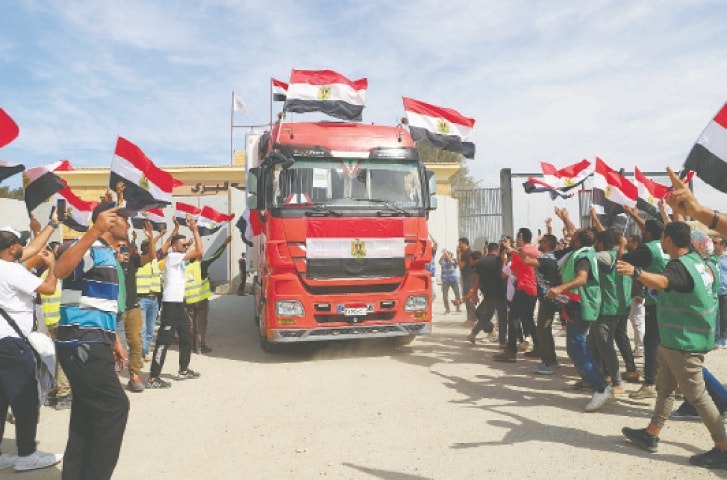In the wake of relentless Israeli bombardment that claimed the lives of dozens of Palestinians overnight, a glimmer of hope emerged as 20 trucks carrying much-needed humanitarian aid entered Gaza through the Rafah border crossing with Egypt on Saturday. These trucks, marked with white flags and echoing their horns, were the first convoy of humanitarian supplies to reach the besieged territory in the past 12 days, offering a ray of light amid the devastating siege. As the people of Gaza continue to endure the horrors of war, the arrival of this aid is a crucial lifeline. However, concerns are raised as the aid lacks essential fuel supplies for generators and emergency vehicles, leaving lives at risk.
International Appeal for Ceasefire and Humanitarian Access
UN agencies have issued a heartfelt appeal for a humanitarian ceasefire and unhindered access for humanitarian aid throughout Gaza. The joint statement from the UNDP, UNFPA, UNICEF, WFP, and WHO calls for immediate, unrestricted humanitarian access to ensure that vital assistance reaches civilians in need, saving lives and alleviating further suffering. This united plea emphasizes the necessity of a sustained flow of humanitarian aid, allowing Gazans to preserve their dignity amid this dire situation.
Disappointment Over Missing Fuel Supplies
While the arrival of aid is a significant relief, the Palestinian community has expressed disappointment as the delivered aid package lacks essential fuel supplies to power generators and emergency vehicles. The Gaza health ministry has warned that the absence of fuel puts patients and injured individuals at grave risk, hindering necessary medical interventions. Despite the arrival of food and medical supplies, the absence of fuel remains a critical concern for Gaza’s already strained healthcare system.
International Concerns and Call for Unhindered Aid Flow
International figures, including US Secretary of State Antony Blinken, have welcomed the opening of the Rafah border crossing for humanitarian aid. However, there is a shared concern, echoing Israeli warnings, that the aid must not fall into the hands of Hamas. Blinken emphasizes the importance of keeping the Rafah crossing open to ensure the continued movement of vital aid, emphasizing its imperative role in the welfare of Gaza’s population. He underscores that the provision of this life-saving assistance should not be hampered by any interference.
While the arrival of humanitarian aid offers a glimmer of hope in war-ravaged Gaza, challenges persist, with fuel supplies conspicuous by their absence. As the conflict continues to exact a heavy toll on Gaza’s residents, with thousands killed and much of the territory’s infrastructure destroyed, the aid delivered is seen as only a “drop in the ocean.” The international community, including UN agencies and governments, reiterates the need for a ceasefire, unrestricted humanitarian access, and an increased scale of aid delivery to alleviate the dire situation faced by the people of Gaza. In the midst of this ongoing conflict, the world watches as Gaza remains a battleground for survival, and the call for peace and humanitarian assistance grows louder.















